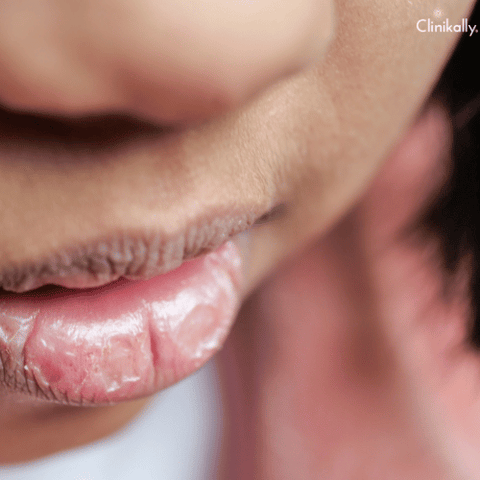As a natural solution for numerous skincare needs, including lip care, coconut oil has grown in popularity. It contains numerous qualities, including potential antibacterial action and moisturization, that may be advantageous for the lips. Lauric acid is one of the fatty acids found in coconut oil, which can help hydrate and moisturise the lips. Lips can be kept soft and supple by applying coconut oil topically to establish a barrier and stop moisture loss. Lauric acid and caprylic acid, two substances found in coconut oil, have antibacterial effects. If you suffer from problems like cracked or chapped lips, these characteristics may help prevent bacterial or fungal infections on the lips. In addition to offering moisturization and possibly antibacterial properties, coconut oil can be a natural and inexpensive option for lip care. Individual sensitivities must, however, be taken into account, as well as other elements like sun protection and the severity of your lip problem.
Unpacking the Power of Coconut Oil

Recent years have seen a rise in the use of coconut oil due to its many potential advantages and adaptability. When examining the benefits of coconut oil, keep the following things in mind:
-
Nutritional Composition: Coconut flesh is the source of coconut oil, a saturated fat. Lauric acid, caprylic acid, and capric acid are among the medium-chain triglycerides (MCTs) that make up the majority of them. MCTs are metabolised by the body differently than other fats, and they are used as energy right away as opposed to being stored as fat.
-
Skincare: Coconut oil is frequently used in skincare products due to its moisturising properties. It can improve the function of the skin's barrier, moisturise the skin, and halt water loss. It's crucial to keep in mind, though, that not everyone should use coconut oil, especially if they have sensitive or acne-prone skin because it may clog pores and lead to breakouts.
-
Hair care: To hydrate, condition, and add shine to the hair, coconut oil is frequently used. It can be applied as a leave-in conditioner, hair mask, or pre-shampoo treatment. Some people discover that using coconut oil on their hair improves manageability and reduces frizz. However, depending on a person's hair type and preferences, just like with skincare, its efficacy may differ.
-
Baking and cooking: Coconut oil is a well-liked cooking oil, especially in tropical areas. It is suitable for high-temperature cooking techniques like frying and sautéing because it has a high smoke point. Additionally, its distinctive flavour gives foods a distinct flavor. The use of coconut oil should be done in moderation because of its high saturated fat content.
-
Oral Health: Some people use coconut oil to pull oil, an age-old Ayurvedic practice. Oil pulling is a method of removing microorganisms from the mouth and promoting oral hygiene that involves swishing oil around for several minutes. Oil pulling should not, however, be used as a substitute for routine brushing and flossing because there is little scientific data to support its efficacy.
-
Health Considerations: While coconut oil has become more popular because of its conceivable health advantages, it's crucial to remember that it contains a lot of saturated fat. Large saturated fat intake may raise cholesterol levels and increase the risk of cardiovascular disease. It's important to practise moderation and to choose healthy unsaturated fats as your main dietary source, such as olive oil.
What Is Coconut Oil?
A specific kind of edible oil called coconut oil is taken from the meat of mature coconuts. It is extracted mechanically or using a solvent, and then it is refined or filtered to create a clear, colourless oil. Saturated fats, comprising medium-chain fatty acids like lauric acid, caprylic acid, and capric acid, make up the majority of the composition of coconut oil. Antioxidants and traces of vitamins E and K are also present. Depending on elements like the type of coconut used and the technique of extraction, the makeup of coconut oil may vary slightly.
Coconut oil has a unique tropical scent and a creamy texture in its solid state. At room temperature, it readily melts and turns into a clear liquid. Coconut oil has a melting point of about 76 degrees Fahrenheit (24 degrees Celsius). In tropical areas where coconuts are plentiful, coconut oil is frequently used in cooking and baking. It is frequently used as a cooking oil, flavor enhancer, and ingredient in many different foods, including snacks, desserts, and meals. It is also used to make processed foods and confectionery products.
Coconut oil is now widely used for cosmetics, hair care, and oral health, in addition to its culinary applications. Due to its moisturising qualities, it is frequently used in cosmetics, including lip balms, hair masks, and moisturisers. While coconut oil has several applications and may have some advantages, it is also heavy in saturated fat, so it is best to use it sparingly in your diet and daily routine.
Benefits of Coconut Oil in Skincare
Coconut oil is a popular ingredient in skincare products and has been used for various purposes. Here are some potential benefits of coconut oil for skincare:
-
Moisturising: Coconut oil is well-known for its moisturising properties. It hydrates the skin by forming a protective barrier that prevents water loss, making it particularly useful for dry or dehydrated skin. The emollient properties of the oil can help soften and smooth the skin's surface.
-
Effects on Inflammation: Coconut oil contains compounds that may have anti-inflammatory properties. It can help soothe and calm irritated or inflamed skin, making it potentially beneficial for conditions like eczema, dermatitis, or sunburn.
-
Antimicrobial Activity: Lauric acid, found in coconut oil, has antimicrobial properties. Lauric acid can help fight certain bacteria, fungi, and viruses, making it potentially useful for acne and fungal infections.
-
Skin Barrier Function: Coconut oil contains fatty acids that can help strengthen the skin's natural barrier function. Coconut oil can help shield the skin from irritants, pollutants, and moisture loss by supporting a healthy skin barrier.
-
Anti-aging and Skin Health: Coconut oil is full of antioxidants like vitamin E that can help shield the skin from oxidative stress and damage brought on by free radicals. Additionally, some studies indicate that using coconut oil may help rejuvenate wrinkled skin and promote a more youthful complexion by minimising its appearance.
-
Makeup Remover: Coconut oil works well to remove makeup naturally. Its oil-based characteristics can aid in dissolving and removing makeup, including waterproof formulations, without removing the skin's natural oils.
Although coconut oil may have advantages for skincare, it's crucial to remember that not everyone will experience these advantages. For certain people, it can be comedogenic (pore-clogging), causing outbreaks or aggravating skin that is prone to acne. Additionally, coconut oil may irritate or cause allergic responses in people with sensitive skin. It's advisable to conduct a patch test on a small area of your skin before using coconut oil in your skincare regimen to check for any negative responses. Additionally, it is generally advised to use high-quality, cold-pressed, and unprocessed coconut oil for skincare.
Coconut Oil in Lip Care: An Effective Substitute?

Due to its moisturising qualities and potential advantages for the lips, coconut oil can serve as a reliable option for lip care products. The benefits of using coconut oil for lip care include the following:
-
Moisturization: Coconut oil is a fantastic moisturiser for dry or chapped lips due to its emollient qualities. It keeps the lips soft and supple by aiding in the locking in of moisture and preventing dehydration.
-
Healing and Calming: The anti-inflammatory qualities of coconut oil can help calm and soothe irritated or inflamed lips. Applying coconut oil can help soothe and speed up the healing of cracked or sore lips.
-
Protection: Coconut oil coats the lips to create a barrier that protects them from damaging elements like wind, cold, and UV rays. The lips are shielded from drying out and damaged by this barrier, which also aids in preventing moisture loss.
-
Lip Balm Substitute: Coconut oil can be used in place of lip balm. Apply a small amount of coconut oil directly to your lips or combine it with other ingredients such as beeswax or shea butter to make a homemade lip balm. This allows you to personalise the product based on your preferences and needs.
While coconut oil can be helpful for many people, it might not be effective for everyone. It's crucial to keep that in mind. For some people, coconut oil could be comedogenic, which means it might clog the pores near the lips and cause irritation or breakouts. Before using coconut oil extensively on sensitive or acne-prone skin, you might wish to perform a patch test on a tiny portion of your lips. The fluidity of coconut oil can also change with temperature. Coconut oil can freeze in colder climates, which might make it less suitable for use right away. To make it simpler to distribute on the lips, you can warm it up in your palms or apply it after rubbing it between your fingers.
Coconut Oil as a Natural Lip Balm
Due to its moisturising and protecting qualities, coconut oil can be used as a natural lip balm. Here's how to make a DIY lip balm with coconut oil:
-
Choose high-quality coconut oil: Choose organic, cold-pressed, and unrefined coconut oil to ensure you're using a pure and natural product.
-
Make a small container as follows: Locate a clean, empty container suitable for storing your homemade lip balm. Small jars or lip balm tubes can be used.
-
Optional additions: If you want to improve the benefits and texture of your lip balm, you can experiment with different ingredients. For example, you can add a small amount of beeswax, shea butter, or cocoa butter to give the lip balm a more solid consistency and extra nourishing properties.
-
Melting and mixing: If your coconut oil is solid, melt it in a microwave-safe bowl or over a double boiler. If you're adding other ingredients, melt them with the coconut oil and stir thoroughly to ensure they're thoroughly combined.
-
Cooling and solidifying: Allow the mixture to cool slightly before pouring it into the container of your choice. Leave it alone until it has completely solidified. Depending on the temperature, this process could take several hours.
-
Application: The lip balm is ready to use once it has solidified. Simply apply a small amount to your lips and evenly distribute it. Reapply as needed throughout the day, especially when your lips feel dry or chapped.
Lip balm with a coconut oil base moisturises and protects the lips, keeping them moisturised and halting moisture loss. But it's crucial to take into account a few things:
-
The lip balm may soften or melt in warm temperatures because coconut oil can have a relatively low melting point. If it's hot outside, keep it in the refrigerator or store it somewhere cool.
-
If you have sensitive or acne-prone skin, you may find that coconut oil is comedogenic or irritating for you. If you experience any negative reactions, stop using it and think about switching to another type of lip balm.
It's important to find the lip care method that works best for your lips and your preferences, even though coconut oil is a natural and affordable option.
Advantages and Limitations of Using Coconut Oil on Lips
There are many benefits to using coconut oil on your lips, but there are also some drawbacks to take into account. The benefits and drawbacks of applying coconut oil to the lips are outlined below:
Advantages:
-
Moisturization: A natural moisturiser like coconut oil can hydrate dry, chapped lips. It creates a shielding layer on the lips that shields them from moisture loss and keeps them supple and soft.
-
Healing and Calming: The anti-inflammatory qualities of coconut oil can help calm and soothe irritated or inflamed lips. It can speed up the recovery of chapped or painful lips.
-
Natural and safe: Coconut oil is a natural product with no added chemicals or artificial ingredients. It may be a better option for those looking for a more natural approach to lip care.
-
Versatility: Coconut oil can be used on its own or as a component in homemade lip scrubs, lip masks, and lip balms. Due to its adaptability, it can be customised to suit individual needs and preferences.
Limitations:
-
Comedogenic Potential: Coconut oil has a comedogenic rating, which means it has the potential to clog pores. When using coconut oil on the lips, some people with acne-prone or sensitive skin may experience breakouts or skin irritation. If you have such skin concerns, it is best to perform a patch test and observe how your skin reacts.
-
Texture and Melting Point: Because coconut oil has a low melting point, it can become liquid or soft at high temperatures. This can make using it as a lip balm messy or inconvenient, especially in hot climates or during the summer months.
-
SPF Protection: Coconut oil does not provide adequate sun protection. If you want sun protection for your lips, you should look into alternative products that contain SPF ingredients.
-
Individual Sensitivities: Everyone's skin is different, and while coconut oil works well for many people, some people may be sensitive or allergic to it. It's essential to be aware of any adverse reactions and discontinue use if needed.
How to Use Coconut Oil for Lip Care

Coconut oil is a natural substance that has moisturising and nourishing qualities that make it useful for lip care. The following are some lip-care tips using coconut oil:
-
Choose high-quality coconut oil: To ensure purity and maximum benefits, look for organic, cold-pressed, and unrefined coconut oil.
-
Exfoliate your lips: Exfoliate your lips before applying coconut oil to remove any dead skin cells. You can achieve this by gently rubbing a sugar and honey mixture on your lips in a circular motion. Using warm water, rinse and pat dry the mixture.
-
Apply coconut oil: Apply a small amount of coconut oil to your lips using your fingertip or a clean cotton swab. Begin with a thin layer and build up as needed. Your lips' warmth will melt the solid coconut oil, making it easier to spread.
-
Massage your lips: Using circular motions, gently massage the coconut oil into your lips. This will ensure better absorption of the oil and aid in blood circulation.
-
Leave it on or wipe it off: If you're using coconut oil overnight, you may want to leave it on your lips so that your lips can benefit from its moisturising properties. However, you can remove the extra oil after 15-20 minutes if you'd rather feel less oily.
-
Repeat as necessary: To maintain hydrated and nourished lips, repeat the process 1-2 times daily for best results.
DIY Lip Balm with Coconut Oil
Making your own lip balm at home using coconut oil is a simple and enjoyable DIY task. Here is a simple recipe to get you going:
Ingredients: 2 tablespoons coconut oil and 1 tablespoon beeswax pellets; optional: a few drops of fragrance-enhancing essential oil, like peppermint, lavender, or vanilla.
Instructions:
-
Set up a double boiler first. A small saucepan should have a few inches of water in it, and it should be heated to medium. A heat-safe glass or metal bowl should sit snugly atop the saucepan without touching the water.
-
Beeswax pellets and coconut oil should be added to the bowl. As they melt and blend, give them a little time to mix occasionally with a spatula or spoon.
-
If desired, fragrance can be added to the mixture by adding a few drops of essential oil. Stir thoroughly to combine.
-
Remember that the bowl will be hot when you remove it from the heat. Pour the mixture into small jars or lip balm containers after allowing it to cool for a few seconds.
-
Fill the containers you've selected with the mixture. Don't overfill them or spill anything; just fill them all the way up. To make the process neater and simpler, it's a good idea to use a pipette or a tiny funnel.
-
Allow the lip balm to fully cool and set. At room temperature, this process typically takes 20 to 30 minutes, but you can also put them in the refrigerator to hasten the solidification process.
-
Cap the containers once they are solid, then label them with the ingredients and the preparation date.
Precautions When Using Coconut Oil on Lips
While applying coconut oil to the lips is generally safe, it's important to take the following safety measures:
-
Allergic reactions: Some people are allergic to coconut oil. Apply a small amount of coconut oil to your inner wrist or forearm as a patch test before applying it to your lips. Wait 24 hours to see if there are any allergic reactions, such as redness, itching, or swelling. If you have any negative reactions, stop using it.
-
Sensitivity to oiliness: Due to the greasy texture of coconut oil, some people may find it uncomfortable or overly oily on their lips. If you are sensitive to oiliness, you may want to use less coconut oil or wipe off the excess after a few minutes.
-
Sun protection factor (SPF): Coconut oil has a low natural SPF (sun protection factor) of around 4-5. While it can provide some sun protection, it is not a replacement for proper sunscreen. If you intend to spend a significant amount of time outdoors, especially in direct sunlight, it is critical to use a lip balm or sunscreen with a higher SPF to adequately protect your lips.
-
Contamination: To avoid contamination and ensure the longevity of your coconut oil, always apply it to your lips with clean hands or a clean cotton swab. Take care not to double-dip or add any dirt or debris to the container.
-
Shelf life: Coconut oil has a relatively long shelf life, but it can eventually go rancid. To keep the quality of your coconut oil, keep it in a cool, dry place away from direct sunlight. If you notice any off-odours, discoloration, or changes in texture, it's best to discard the coconut oil and start over.
Conclusion: Embracing Natural Alternatives in Lip Care

In conclusion, those looking for a more natural and chemical-free approach to lip care may find that adopting natural alternatives like coconut oil is a terrific choice. Coconut oil has hydrating and nourishing qualities that keep your lips supple and moisturised. You can make your own DIY lip balms and treatments that suit your tastes by taking the advised precautions and adding additional natural components. It's crucial to remember that each person has a different type of skin, so what works for one person might not work for another. When in doubt or if you have a particular skin condition, it's always a good idea to conduct a patch test and visit a dermatologist. Accepting natural lip care options is a decision that only you can make. The importance of prioritising regular lip care, including hydration, sun protection, and maintaining good general skin health, should not be underestimated, whether you opt for coconut oil, other natural oils, or commercial lip products.








































